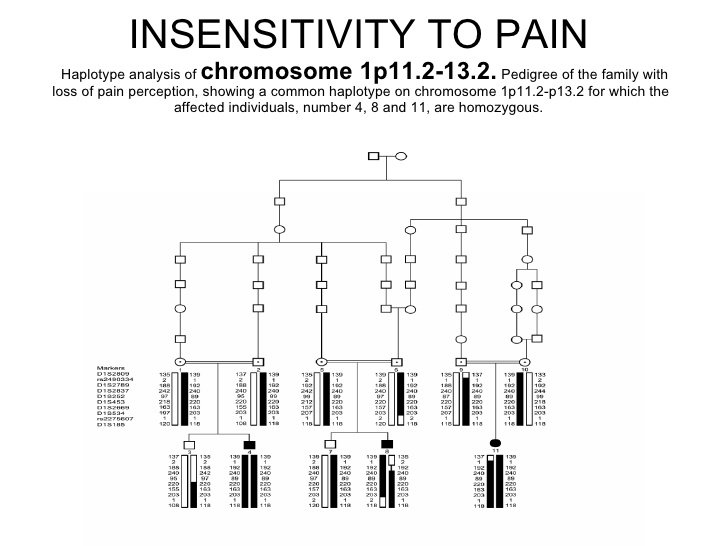Somewhere around the earth, scientists have found a particular rare type of genetic mutation in one of the family. This rare type of genetic mutation had made the family low sensitivity to pain. By this issue, now the scientists have found out the new treatment strategies for people having some kind of chronic pain which becomes the most common conditions in the United States.

ZFXH2 gene (source)
Further study says that, the mutated gene occurred in the Italian family. Researcher revealed that they have a mutation in gene called as Zinc finger homeobox 2 (ZFHX2). This gene has certain kind of tolerance to certain form of pain. These members of the family presented with the history of no pain to the Biomedical Research at University College London. They even told that, they can stand free in the fire and burn themselves and even fracture bone without feeling a pinch of it. Pain is not felt in these conditions.

Pedigree chart of pain insensitivity in family (source)
After some investigation and experiments, they found that the nerve fiber has a normal density and normal intrapeidermal nerve fiber density. Only defect seen was on the nerve fiber working mechanism. The nerve fibre is all there, it is just the cause of not working properly.
Till now, the question rises.. Exactly, why don't they feel much pain ?
The family feels pain in the initial breakout but it goes very quickly. Researchers now are studying and trying to make the treatments for the pain and pain relief using the cases of genetic mutation. In United states, a number of 25.4 million adults lives with some kind of chronic pain. This pain lasts for about 3 months. This kind of pain can hamper the day to day activities and affect the person's mobility.
Now days, certain medications helps on reducing the pain like the drugs of anti-inflammatory non-steroidal (NSAIDs) and when in severe condition, use of opioids. Using these treatments frequently can develop certain risk to diseases. These treatments may sometime be no successful.
The team of researchers have been working to find out some congenital analgesia with some associated clues. They are working to find some other pain relief strategies.
What is the gene type that is behind this pain insensitivity ?
Born from newborn, it can be called as congenital insensitivity to pain or congenital analgesia , where a condition occurs when individual is unable to feel a sense of any physical pain anywhere around the body.

Pain sensitivity through NaV1.7 channel (source)
In the body, there some channels that can transmit pain signals when felt in anywhere in the body to the brain. The channel is called as NaV1.7 channel. During the mutation occurring in congenital analgesia, there is a gene called as SCN9A gene. This gene SCN9A gene prevents in forming these channel to transmit pain to the brain from nerves. So, the researchers have been working to investigate whether by blocking these NaV1.7 channel by mutating SCN9A gene can treat the patients with chronic pain or not.They should have produced the effective medications till now.
After these experiments, Dr,Cox and his team of researchers approached the patient and suggested a different method to relieve the chronic pain by involving some kind of replication and mutation in the ZFHX2 gene. Six members of Italian family was thoroughly checked up and their DNA was analyzed with whole exome sequencing and blood sample was taken by the team of researchers who had been experiencing insensitivity to pain. In the family, every member doesn't feel pain response and heat pain, capsaicin which is the active component present in the chilly peppers or some kind of bone fractures.After the name of the family, the researchers quoted the name of the disease as "Marsili Syndrome".

Fig: Karyotype of the patient with insensitive to pain (source)
New treatments can be done with new discovery
From the experiment the researchers created and done, they identified a novel mutations in the gene of ZFHX2 gene. This alter a section of its DNA sequence. When the team made some changes to the mice like making the ZFHX2 gene absent, the pain threshold of the mice or rodents changed from normal.The researchers researched the mice which had the same ZFHX2 gene mutation found in the blood sample of human. They found after the experiment that the rodents were insensitive to the high temperatures. With this condition, they also found that the ZFHX2 gene has control over other genes which can be associated with the pain signalling also.
So, this is all for today in health blog, hope to see you on other blogs .
Thanks for giving a view !
With love
khatisam4

Source Used:
(1) https://www.ncbi.nlm.nih.gov/gene/85446
(2)https://academic.oup.com/brain/advance-article/doi/10.1093/brain/awx326/4725107
Last Post:
How does deprived Sleep disturbes the ability to learn ?
Smartphone addiction leads "Nomophobia" ! - Teens mental health
Phlegm/mucus color shows the health condition !

lots of research is going on that's great thanks for sharing this post
Excellent post many things to learn !!!